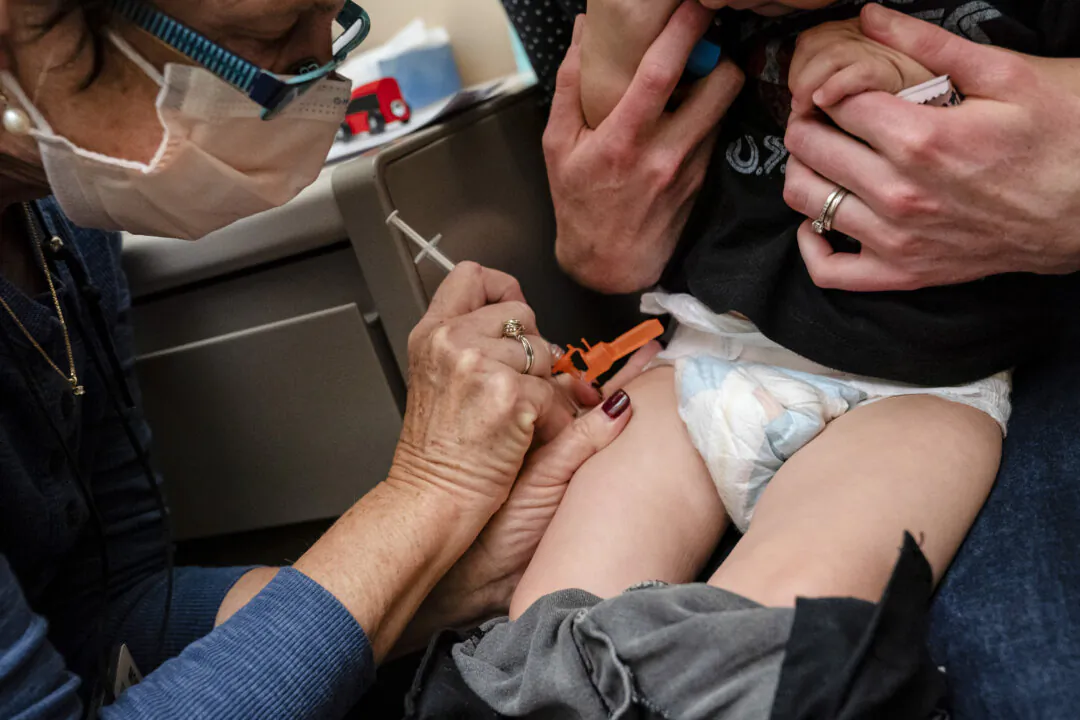Individuals who took COVID-19 vaccines were found to have later suffered from psychosis, with Pfizer and AstraZeneca shots linked to most of the cases.
The peer-reviewed systemic review, published in the Frontiers in Psychiatry journal on April 12, examined cases of new-onset psychosis among people who took the vaccines. Psychosis refers to symptoms that occur when an individual has difficulty differentiating between reality and fantasy, with hallucinations and delusions being two key types. The review looked at 21 articles describing 24 cases of psychosis symptoms following vaccination. The researchers concluded that “data suggest a potential link between young age, mRNA, and viral vector vaccines with new-onset psychosis within 7 days post-vaccination.”
“Collecting data on vaccine-related psychiatric effects is crucial for prevention, and an algorithm for monitoring and treating mental health reactions post-vaccination is necessary for comprehensive management.”
Out of the 24 cases, 13 were female. The median age of participants was 36 years. Twenty-two patients (91.2 percent) had no specific history of somatic illness and comorbidities.
Click here to watch the full documentary “The Unseen Crisis: Vaccine Stories You Were Never Told”
In 33.3 percent of the cases, administration of the Pfizer mRNA vaccine “potentially induced adverse psychiatric events,” the study said. The viral vector AstraZeneca vaccine was linked to psychotic symptoms in 25 percent of cases.
In 45.8 percent of incidences, psychotic symptoms were reported after the first shot and in fifty percent after the second dose.
“Almost all reviewed cases (95.8 percent) presented with psychotic symptoms, such as hallucinations (visual, auditory, olfactory, and tactile) and delusions (mostly persecutory and delusions of reference).”
The most common form of hallucination was auditory, experienced in 54.2 percent of the cases, while visual hallucinations were experienced by 12.5 percent of patients.
“Motor disturbances, such as increased or decreased motor activity and bizarre behavior, were mentioned in 83.3 percent of cases. In 3 (12.5 percent) cases, a suicidal attempt was described.”
The psychotic symptoms mostly lasted for a period of one and two months.
The patients were treated using various methods including antipsychotics and steroids, but only 12 out of the 24 made a full recovery. The remaining suffered from “residual symptoms such as decreased emotional expressions, low affect, or residual psychotic symptoms.”
In one case, the patient reported a positive COVID-19 test result. “Previous studies have shown that individuals with documented comorbidities and a history of COVID-19 infection exhibit a statistically significant increase in adverse events following vaccination,” the study noted.
Researchers speculated that inflammatory conditions following vaccination may be a reason behind the psychosis. The study found elevated C-reactive protein levels and mild to moderate leukocytosis—high white blood cell count—as the most common blood abnormalities. Both conditions have links with inflammation.
Another hypothesis suggested in the study was that post-vaccination psychosis could suggest a manifestation of autoimmune anti-NMDA encephalitis, a condition in which the immune system targets the brain neurons by mistake and causes inflammation.
Researchers noted that instances of anti-NMDA encephalitis have been repeatedly reported after vaccinations against infections like influenza, pertussis, yellow fever, and typhus.
“Considering the potential link between post-vaccination psychosis and autoimmune anti-NMDA encephalitis, it is advisable to consider immunological screening in individuals presenting psychiatric symptoms post-COVID-19 vaccination.”
A third possible reason suggested in the study is that the various speculations and uncertainties regarding the safety of COVID-19 vaccines could lead to people experiencing “significant stress,” which could end up triggering the development of psychiatric reactions.
The authors received financial support for the review, with the article-processing charge funded by Riga Stradins University, Latvia. Researchers declared no conflicts of interest in the study.
Post-Vax Psychosis Cases
Episodes of psychosis after taking COVID-19 shots have been detailed in several case studies. In one instance, a 15-year-old boy from Taiwan was sent to hospital two days after taking the second Pfizer shot. He was screaming and exhibiting agitation and uncontrollable limb stretching.
Other bizarre behaviors included sitting up and lying down frequently. The child was prescribed antipsychotics yet his behaviors continued to persist after being discharged for more than a month.
The doctors then put the boy under a steroid regimen, which is anti-inflammatory and helps calm down an overactive immune system. His symptoms then improved.
In another case from Brazil, a woman in her 30s, who was previously healthy, developed refractory psychosis within 24 hours of taking an mRNA COVID-19 shot. The woman had disorganized thoughts, was aggressive, and believed she was being persecuted at the hospital.
Even though she was treated with mood stabilizers and antipsychotics, her behavior showed improvements only after four months of hospitalization. However, her psychosis continued.
A May 2022 review described the case of an 18-year-old woman who developed psychotic symptoms on the same day she took the first dose of AstraZeneca vaccine.
“Symptoms started few hours after the vaccination with irrelevant talk. Over the next three days, it progressed to irritability, delusions of persecution and reference, and visual hallucinations.”
Another case study detailed the situation of a 45-year-old woman with no family history or personal history of mental disorders who ended up developing psychosis a month after she received a COVID vaccine. She quit her 18-year-old job abruptly and displayed erratic behaviors.



